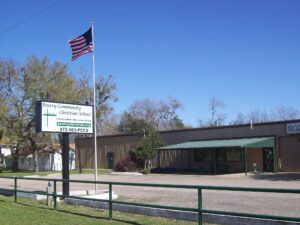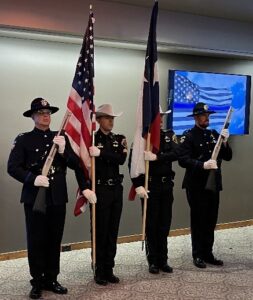“You cannot touch the ball with your hands.” Those are the rules in soccer. The referee or coach will say something if they see it, but you also have the right to call out your fellow player for breaking the rules. Telling another player they have broken the rules might be difficult if they are your friend, if you fear backlash or if you have also broken the rules. God took us to be his own people, or you could say that he put us on his team. We speak his words, Scripture, to one another as teammates sometimes encouraging with the gospel, other times calling out sin.
Jesus sent out his team to call people to repent. In our Gospel reading from Mark 6, we find Jesus sending out his twelve disciples two by two. Jesus allowed them to have the power to drive out demons and heal people, but their message was repentance. All the people in all the towns the disciples went to were sinners, and if left in their sins, would face judgment from God. Jesus sent the disciples to teach people that the only way to be free from their sins and sin’s consequences was to confess their sins to God trusting in his forgiveness.
The Holy Spirit brought some to faith through their message, but others resisted the Holy Spirit. For those who rejected their message, Jesus told his disciples in Mark 6, 11 And if any place will not welcome you or listen to you, leave that place and shake the dust off your feet as a testimony against them. The disciples were sent by Jesus’ authority with Jesus’ message, and for those who rejected, the disciples showed the seriousness of rejection by shaking the dust off their feet. The hope with this dust shaking action was to leave people with the threat of judgment so they would eventually repent and not face God’s judgment at the end of their lives.
The prophet Amos came with a message of judgement. Amos was from the southern kingdom of Judah but was called by God to serve as a prophet to the northern kingdom of Israel. He was a shepherd and took care of sycamore-fig trees, so it is likely that he was in the lower tier of society, though not a guarantee. In other words, he did not make his living by being a prophet. Yet, God took the unconventional Amos and gave him a message to share with the king of Israel, Jeroboam II. Jeroboam II was wicked, embracing worship of calf idols in temples not in the city of Jerusalem with priests who were not from the tribe of Levi, which were fundamental requirements to worshipping the Lord. During his reign, Israel prospered because Egypt, Assyria and Aram were weak, but the love of money and power caused sins of predatory loans, various forms of exploitation of the poor, dishonesty in business dealings and corruption in the legal system. These evil practices would bring God’s judgment, but God was gracious to send a warning and chance to repent through Amos.
When Amos came with the message of judgment, it was not well received. In our Old Testament reading from Amos 7, we read, 10 Then Amaziah the priest of Bethel sent a message to Jeroboam king of Israel: “Amos is raising a conspiracy against you in the very heart of Israel. The land cannot bear all his words. 11 For this is what Amos is saying: “‘Jeroboam will die by the sword, and Israel will surely go into exile, away from their native land.’” Amaziah was one of the corrupt priests. He was threatened by Amos’ prophecy against the wicked Jeroboam II and Israel as a whole. He was defiant coming to the defense of the rampant corruption, evil and sin in Israel.
After he sent his message to the king, he spoke to Amos as we read in Amos 7, 12 Then Amaziah said to Amos, “Get out, you seer! Go back to the land of Judah. Earn your bread there and do your prophesying there. 13 Don’t prophesy anymore at Bethel, because this is the king’s sanctuary and the temple of the kingdom.” Notice Amaziah does not mention God in his selfish rant against Amos. Instead, he wants to keep making his living as a corrupt priest without competition from a legitimate prophet, but again Amos did not make his living as a prophet. Amaziah also focused on the earthly kingdom and influence of the northern kingdom centralized at Bethel, disregarding Jerusalem as the city God meant for worship where his Temple was built. Without a king or prophets who followed the Lord and without repentance, Israel was unrecognizable as God’s chosen people.
As Christians, we share a common call to call one another to repent. Whether it was the shepherd and tree trimmer Amos calling a king and kingdom to repent for rampant sin, or one Christian going to another in private to call them to repent, the common denominator remains repentance. Unfortunately, we often come up with excuses to avoid upsetting the status quo, even though leaving sin unchecked in an unrepentant heart may lead to complete loss of faith and eternal suffering in hell.
Here are some common excuses for not showing fellow Christians their sin: I did not grow up a Christian while so and so is from a long line of Christians, I did not have Christian parents or Christian examples so I don’t know what to say, I don’t want to say the wrong thing, I’m not influential, I didn’t go to school for this, I am an introvert, I’m not the pastor or an elder, I’m young, old, a female, that’s why we have a pastor, that’s why there are other people with the gifts to do this, I’ve tried before and failed, I don’t want to lose a relationship, etc. There are other excuses for one Christian not calling another to repent, but these illustrate many ways we end up agreeing with Amaziah. When we excuse ourselves from calling out another Christian on their sin because of our worldly focus, judgment looms over all involved. It is good for us always to have in mind how serious sin is and our need to be saved from it.
Amos did not give an excuse when he was called to deliver a message of judgment. Instead, he let God be his defense as we read in Amos 7, 14 Amos answered Amaziah, “I was neither a prophet nor the son of a prophet, but I was a shepherd, and I also took care of sycamore-fig trees. 15 But the Lord took me from tending the flock and said to me, ‘Go, prophesy to my people Israel.’” God was with Amos. God broke him free from secular servitude; he did not see himself through the eyes of the world any longer. Instead, Amos was a messenger of God with God’s message; the power behind Amos was God. Those who rejected the message would face God’s wrath, but those who repented would live in the Lord’s deliverance. God has the right to forgive us our sins because of Jesus’ sacrifice.
The idol sacrifices at Bethel Amaziah was involved in saved no one. Even the sacrifices at the Temple in Jerusalem did not save but pointed to the one Great High Priest and sacrificial Lamb of God spoken of in Hebrews 7, 27 Unlike the other high priests, he does not need to offer sacrifices day after day, first for his own sins, and then for the sins of the people. He sacrificed for their sins once for all when he offered himself. The reason our sins are forgiven is Jesus sacrificed once for all. Jesus who rose from the dead, who was accepted by the Father on our behalf, stands in heaven speaking in our defense. We repent and call one another to repent confident that God has delivered us from all our sins and made us his own people, citizens of heaven.
God took us to be his Scripture speakers. All believers have been given the mission to share the Word of God with one another. By the authority of God, we are all given this mission as we hear in 1 Peter 2, 9 But you are a chosen people, a royal priesthood, a holy nation, God’s special possession, that you may declare the praises of him who called you out of darkness into his wonderful light. 10 Once you were not a people, but now you are the people of God; once you had not received mercy, but now you have received mercy. By God’s mercy, we continue to remind one another of the darkness of sin and point to the light of Christ. As all Christians do this, it is important for them to follow a pastor who does this. In our New Testament reading from Titus 1, we hear a description of the position of the pastoral office, who is called to full time public Scripture speaking. Of the long list used to describe those qualified to serve as a pastor, this verse from Titus 1 echoes the need for a pastor to be ready to call others to repent and warn of God’s judgment, 9 He must hold firmly to the trustworthy message as it has been taught, so that he can encourage others by sound doctrine and refute those who oppose it. As the pastor does this, he is a model for those he serves. Our Psalm for today, Psalm 78, shows the power of speaking Scripture to the next generation as we read, 4 … we will tell the next generation the praiseworthy deeds of the Lord, his power, and the wonders he has done… 6 so the next generation would know them… 7 Then they would put their trust in God… 8 They would not be like their ancestors—a stubborn and rebellious generation, whose hearts were not loyal to God, whose spirits were not faithful to him.
We are all Scripture speakers so that the next generation is not lost to sin but would put their trust in God. Opening your Bible, reading, meditating, repeating, praying through the verses, knowing the believers of the past and their lives, and sharing what God did for them is what God has called and continuously equips you to do. Your brothers and sisters in Christ will benefit from hearing you share Scripture with them, both the law and the gospel.
“You cannot touch the ball with your hands.” Those are the rules in soccer. The referee or coach will say something if they see it, but you also have the right to call out your fellow player for breaking the rules. Jesus died for all the rules we have broken. He was the priest and sacrifice who saved us once and for all whose resurrection saved us from judgment. We speak his Scripture to one another sometimes encouraging with the gospel, other times calling out sin. We get to do this because God called us to be his own to serve him and one another. Go share Jesus with one another because God took you from secular servitude to Scripture speaker. Amen.
Gunnar Ledermann, Pastor Divine Peace Church

Gunnar Ledermann
I’m passionate about Rockwall’s vibrant community and actively engage with local non-profits and community organizations, including the Rockwall Chamber of Commerce, the City of Rockwall, and the Downtown Rockwall Association. My background includes a bachelor’s degree in Classical Languages and a master’s degree in divinity. Currently serving as a pastor at Divine Peace Church in Rockwall, I also enjoy spending time with my wife, Marinda, and our three children.



































